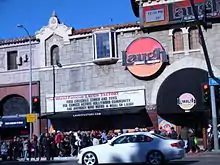Jamie Masada
Jamie Masada (Persian: جمی ماسادا, born in Iran) is an American businessman and comedian. He is the founder of the Laugh Factory, a chain of comedy clubs in several states.
| Jamie Masada | |
|---|---|
| Born | 1954 Iran |
| Medium | Comedy club owner, television producer |
| Years active | 1979–present |
Early years
Masada arrived in America as a teenager. Despite the fact that he was living in a garage and barely spoke English, he combined Persian and Hebrew and soon was working with professional comedians like Richard Pryor, Jay Leno, David Letterman and Redd Foxx.[1]
Career
Laugh Factory
In 1979, Masada used a loan from Neal Israel to open the Laugh Factory on Sunset Boulevard.[2] While other comedy club owners in Los Angeles were not paying the comedians,[3] his goal was to create a venue where comedians could perform and earn money by "splitting the door".[4]
The Laugh Factory Presents
The Laugh Factory Presents is an online stand-up comedy series, which Masada created for up-and-coming comedians to spread their material to a wider audience via YouTube and Amazon.com. Masada's plan is to film comedians' shows on the Laugh Factory stage and allow them to keep 80% of the profits made from the specials. With the help of Laugh Factory New Media, Masada produced two The Laugh Factory Presents specials, The Laugh Factory Presents Tim Gaither Live from Las Vegas[5] and The Laugh Factory Presents Raj Sharma Live from Las Vegas.[6][7]
Honors and awards
In recognition of all his hard work, Masada is the recipient of the Ellis Island Medal of Honor, the ACLU Freedom of Speech Award and the NAACP Freedom Award.[8] In 2011, Masada received an award from Didi Hirsch Mental Health Services for being a Comedy Innovator and Humanitarian and for offering comics a listening ear to deal with their personal demons.[9][10][11]
Philanthropy

In an effort to support under-privileged children, Masada created the Laugh Factory's Comedy Camp for children in 1985. Through this camp, he has worked with over a thousand children, using comedy as a way to build their self confidence.[12][13]
Since 1979, Masada has hosted free Thanksgiving and Christmas dinners at The Laugh Factory for the homeless, the poor, or anyone who doesn't want to be alone for the holidays, with over 5000 attending in 2008.[14]
The Laugh Factory also hosts free services during the High Holy Days of Judaism.[15]
References
- Tommy Garrett (8 March 2009). "The Laugh Factory And Jamie Masada, No Laughing Matter". Canyon News. Archived from the original on 4 March 2016. Retrieved 31 March 2016.
- "A Drink With Jamie Masada". A Drink With. 16 January 2013. Retrieved 18 March 2014.
- Zoglin, Richard. "The First Comedy Strike". Time. Retrieved 18 March 2014.
- "Searching for Richard Pryor". The Huffington Post. 19 July 2014. Retrieved 8 April 2016.
- "Laugh Factory Presents Tim Gaither Live from Las Vegas (Video 2014)". IMDb. 17 February 2014. Retrieved 8 April 2016.
- Jarvey, Natalie. "Laugh Factory Releases Online Comedy Special". The Hollywood Reporter. Retrieved 18 March 2014.
- "Laugh Factory Presents Raj Sharma Live in Las Vegas (Video 2014)". IMDb. 17 February 2014. Retrieved 8 April 2016.
- "Our Leadership". Laugh Factory. Retrieved 18 March 2014.
- "Are comedians really depressed? Or is sadness just funny?". Slate Magazine. Retrieved 8 April 2016.
- Hollie McKay. "Stand-Up Comedians to Receive Free Psychological Treatment at Hollywood's Laugh Factory". Fox News. Retrieved 8 April 2016.
- Los Angeles Times (27 August 2014). "This psychologist helps comedians keep laughing". latimes.com. Retrieved 8 April 2016.
- Banks, Sandy. "Comedy Camp participants learn to 'wring laughs from my tears'". Los Angeles Times. Retrieved 18 March 2014.
- "» Kids Comedy Camp at the Laugh Factory". Archived from the original on 16 April 2016. Retrieved 8 April 2016.
- Olivarez-Giles, Nathan. "Laugh Factory owner is serious about comedy". Los Angeles Times. Retrieved 18 March 2014.
- "Free High Holiday Services 2012". The Jewish Journal of Greater Los Angeles. Retrieved 18 March 2014.
Further reading
- "Laugh Factory owner is serious about comedy". Los Angeles Times.
- Brian Lowry. "Laugh Factory's Jamie Masada Looks for Funniest Person in the World - Variety". Variety.
- Kevin Noonan. "Jamie Masada Continues Delivering Thanksgiving Alms at the Laugh Factory". Variety.
- Variety's "The Movie That Changed My Life". pp. 46–48.
- Vintage Tomorrows. pp. 296–. (subscription required)
- Comic Insights. pp. 264–269. (subscription required)
- "Masada goes into spin tale". Variety. (subscription required)
- "Jamie Masada". Variety. (subscription required)
- "Stand-Up Guy". Los Angeles Magazine. (subscription required)
- "Laugh Factory Founder Hopes to Unite Countries through Search for 'Funniest Person in the World'". Los Angeles Daily News. (subscription required)
- Engelberg, Keren (June 11, 2006). "Profile: Jamie Masada". Hadassah Magazine. Retrieved April 12, 2016.CS1 maint: ref=harv (link)